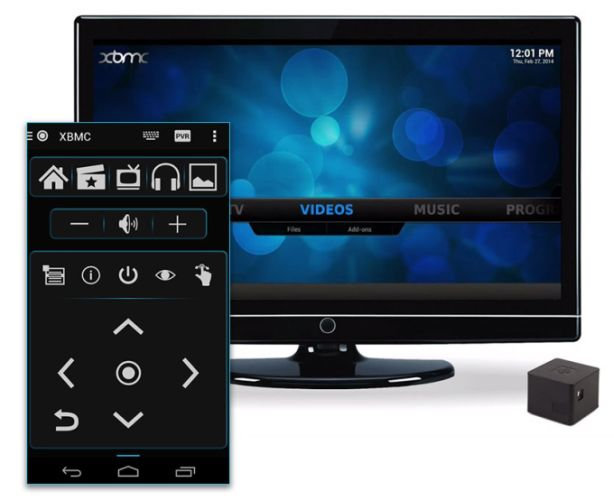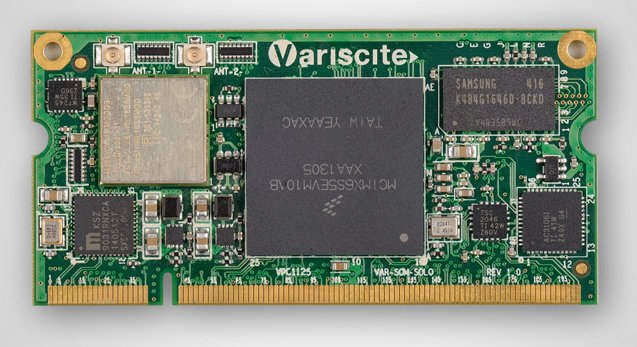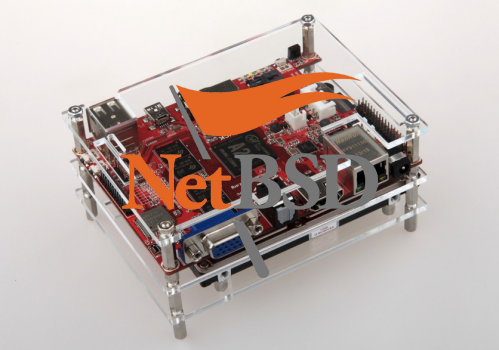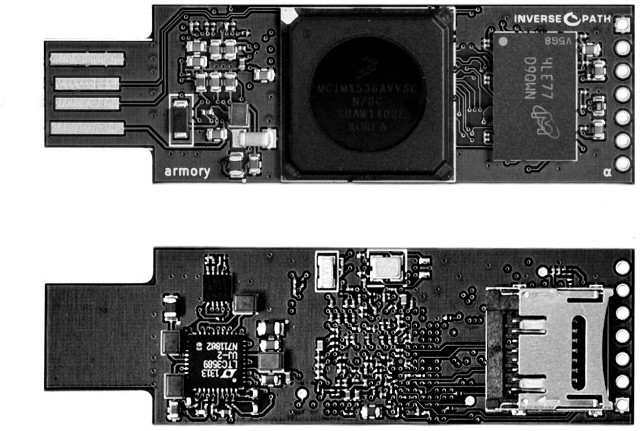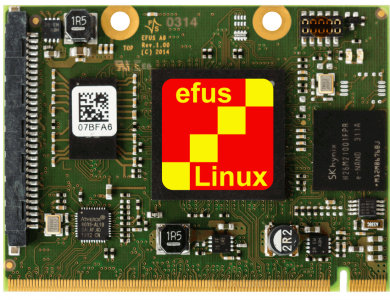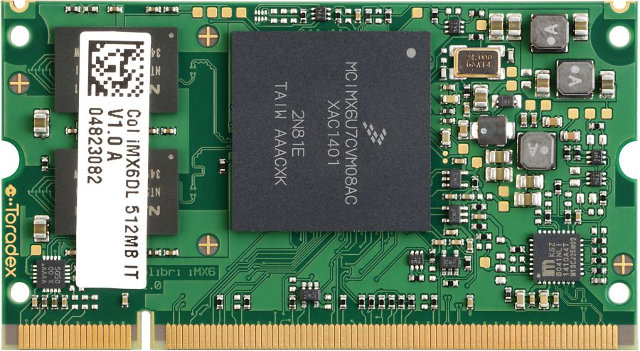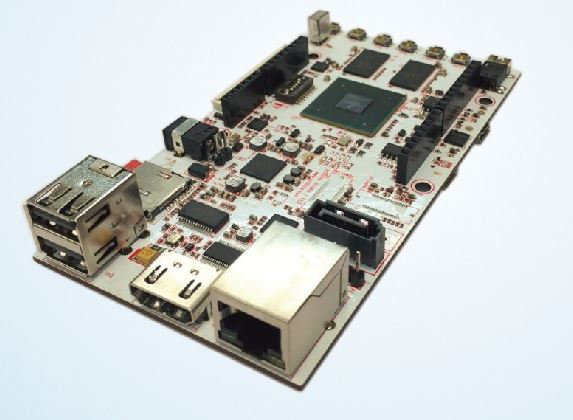Last year, Solidrun launched their Cubox-i mini PCs powered by Freescale i.MX6 single, dual or quad core processor, and running Debian, OpenSUSE, Android 4.4, or various XBMC based Linux distributions. The company has now announced a new product called CuboxTV, that on surface looks similar to their Cubox-i4Pro mini PC with a quad core processor, but instead of running Linux desktop distributions, or Android, it’s pre-loaded with OpenELEC Linux distribution running Kodi 14. CuboxTV specifications: SoC – Freescale i.MX6 Quad with four Cortex A9 core up to 1GHz, and Vivante GC2000 3D GPU System Memory – 1GB SDRAM @ 1066 MHz Storage – 8GB internal storage + micro SD interface Video Output – HDMI 1.4b, 3D support Video Decoders – MPEG-4 ASP, XVID, H.264 HP, H.263, MPEG-2 MP, MJPEG BP, VP8, Sorenson-H263. Video Encoders – MPEG-4 SP, H.264 BP, H.263, MJPEG BP Image Codecs – JPEG, BMP, GIF, PNG. Audio […]
Variscite VAR-SOM-SOLO is a Tiny System-on-Module Based on Freescale i.MX6 Solo Processor
Freescale will soon announce i.MX6 SoloX dual core processor with ARM Cortex A9 and M4 cores, and dual-port gigabit Ethernet, but companies still design and manufacture new Freescale i.MX6 Solo/Dual/Quad based hardware for their mostly industrial customers. Variscite has recently launched a smaller version of their VAR-SOM-MX6 system-on-module called VAR-SOM-SOLO powerd by Freescale i.MX6 Solo processor with up to 1GB RAM, up to 512MB NAND flash for boot code, up to 64GB eMMC flash for storage, and TI WiLink8 module with Wi-Fi and Bluetooth Smart. Variscite VAR-SOM-SOLO technical specifications: SoC – Freescale i.MX6 single core ARM Cortex-A9 core @ 1.0GHz with Vivante GC 880 + Vivante GC 320 GPU, and VPU supporting 1080p30 H.264 encode and decode. System Memory – 256MB to 1GB DDR3 RAM Storage – 128MB to 512MB NAND flash for boot code, 4GB to 64GB eMMC flash, and SD/MMC via edge connector Video Output / Display Interfaces: […]
NetBSD 7.0 To Support Multi-Core ARM Processors from Allwinner and Freescale
NetBSD is an open source Unix-like Open Source operating system running on a wide range of platforms, from servers and desktop systems to embedded devices. The operating system has supported ARM since 1996, with more recent ports for ARM Cortex A8 and Raspberry Pi, but until recently it did not support SMP (Symmetric multiprocessing) to support more than one core. But NetBSD has now fixed this “anomaly” and the following Allwinner A20/A31 and Freescale i.MX6 boards are now supported: Banana Pi (BPI) Cubieboard 2 (CUBIEBOARD) Cubietruck (CUBIETRUCK) Merrii Hummingbird A31 (HUMMINGBIRD_A31) CUBOX-I NITROGEN6X You can give it a try on Allwinner boards by creating an SD card following instructions on NetBSD / Allwinner Wiki. There does not seem to be documentation for the Freescale boards yet. If Allwinner documentation is up-to-date, this is a headless image, as framebuffer, HDMI, etc… are still in to TODO list, but Gigabit Ethernet and […]
USB Armory is an Open Source Hardware Freescale i.MX53 Dongle for Security Applications
Most computers-on-a-stick come with an HDMI port, and a few USB ports, but Inverse Path’s dongle is quite different. USB Armory is a flash drive sized computer powered by Freescale i.MX53 Cortex A8 processor with only a USB port and a micro SD slot, that targets security applications such as mass storage devices with automatic encryption, virus scanning, host authentication and data self-destruct, VPN routers, electronic wallets, password managers, portable penetration testing platforms, and so on. USB Armory specifications: SoC – Freescale i.MX53 ARM Cortex-A8 @ 800Mhz with ARM TrustZone System Memory – 512MB DDR3 RAM Storage – microSD card slot USB – 1x USB host port. USB device emulation: CDC Ethernet, mass storage, HID, etc. Expansion Header – 5-pin breakout header with GPIOs and UART Misc – customizable LED, including secure mode detection Power – 5V via USB (<500 mA power consumption) Dimensions – 65 x 19 x 6 […]
Linux 3.17 Released
Linus Torvalds announced the release of Linux Kernel 3.17 on Sunday: So the past week was fairly calm, and so I have no qualms about releasing 3.17 on the normal schedule (as opposed to the optimistic “maybe I can release it one week early” schedule that was not to be). However, I now have travel coming up – something I hoped to avoid when I was hoping for releasing early. Which means that while 3.17 is out, I’m not going to be merging stuff very actively next week, and the week after that is LinuxCon EU… What that means is that depending on how you want to see it, the 3.18 merge window will either be three weeks, or alternatively just have a rather slow start. I don’t mind getting pull requests starting now (in fact, I have a couple already pending in my inbox), but I likely won’t start processing […]
F&S Elektronik Systeme Introduces eFus A9 Industrial Computer Modules Powered by Freescale i.MX6 SoC
F&S Elektronik Systeme, a German embedded systems company, has announced their efus A9 Computers-on-Module (CoM) based on Freescale i.MX6, are now in mass production. The CPU comes in two variants A9V2 for i.MX6 Solo, and A9V3 with i.MX6 DualLite, both of which are certified for automotive and industrial applications, and support commercial, extended, and industrial temperature ranges. eFuse A9 computer-on-module specifications: SoC – CPU Freescale i.MX6 Solo (eFus A9V2) or DualLite (eFus A9V3) @ up to 1.2 GHz + Vivante 2D and 3D GPUs System Memory – 512MB (Up to 1GB RAM) Storage – 256 MB NAND flash (Up to 1GB), 2 GB eMMC (eFus A9V3 only. up to 32GB), optional SPI NOR, optional I2C EEPROM Display I/F – 18-bit RGB, 2x 24-bit LVDS, and DVI Other interfaces available via 230 pins MXM-2 edge connector: 2x SD card I/F 1x Gigabit Ethernet 1x USB Host, 1x USB Device 2x CAN […]
Toradex Colibri i.MX6 SoM with Freescale i.MX6 Solo and DualLite Processors
Toradex has added a new system-on-module to its Colibri family with Colibri IMX6 SoM powered by either Freescale i.MX 6Solo singl core processor, or i.MX 6DualLite dual core core processor. The SoMs are available in both both commercial and industrial temperature grade, come with up 4GB eMMC, 256 to 512MB RAM, and support Linux or Windows Embedded operating systems. Specifications listed for the Toradex Colibri i.MX6 module include: SoC – Freescale i.MX6 Solo single core or DualLite dual core Cortex-A9 core @ 800MHz (Industrial temp.) or 1GHz (Commercial temp) with Vivante 2D/3D GPUs. System Memory – 256MB (Solo) or 512MB (DualLite) DDR3 Storage – 4GB eMMC flash I/Os available via the 200-pin SO-DIMM connector: 3x 8-bit SDIO/SD/MMC 10/100M Ethernet (Micrel KSZ8041NL PHY) USB 2.0 host, USB 2.0 OTG Video Output HDMI 1.4a up to 1080p resolution RGB up to 1920×1200 (24bpp) Camera – 2x Camera Parallel inputs Audio – Audio line-in […]
pcDuino Acadia 1 is a Freescale i.MX6 Quad Development Board with Arduino Headers
Linksprite has been pretty busy recently. After announcing the $39 pcDuino3 Nano, they’ve now unveiled a new board named pcDuino Acadia 1 powered by Freescale i.MX6 Quad processor with 1GB RAM, 8GB eMMC, a few common ports, and Arduino headers in order to connect Arduino shields to their Linux/Android board. pcDuino Acadia 1 (preliminary) specifications: SoC – Freescale i.MX6 Quad with four ARM Cortex A9 cores up to 1.2GHz, and Vivante GC2000 GPU with support for OpenGL/ES 2. x, OpenCL EP support, and OpenVG 1.1. System Memory – 1GB DRAM Storage – 8GB eMMC, 2x micro SD card slots (up to 128GB), and SATA Video Output – HDMI 1.4 with HDCP support, LVDS Audio Output – 3.5mm analog audio interface Camera – 1x MIPI, 1x CSI Connectivity – 10/100/1000Mbps Ethernet (limited to 470Mbps) USB – 2x USB 2.0 host ports, 1x micro USB OTG Expansion Headers – Arduino UNO compatible […]


